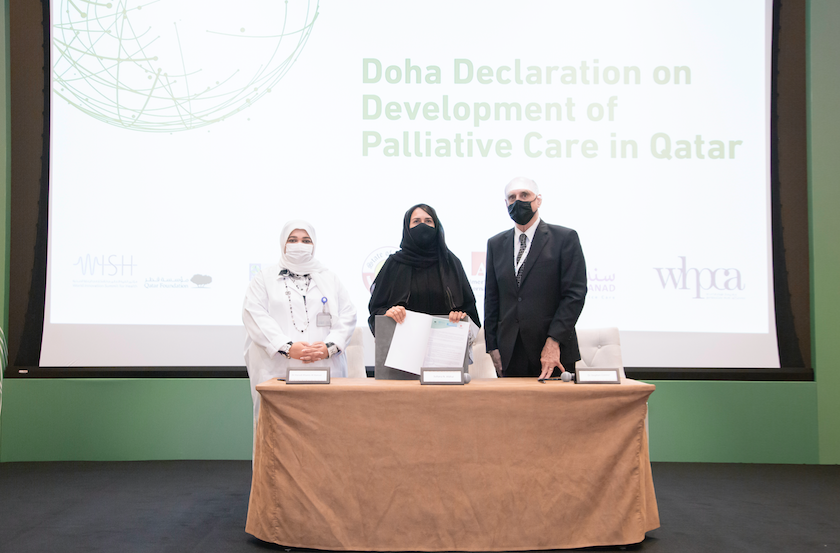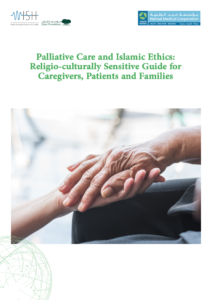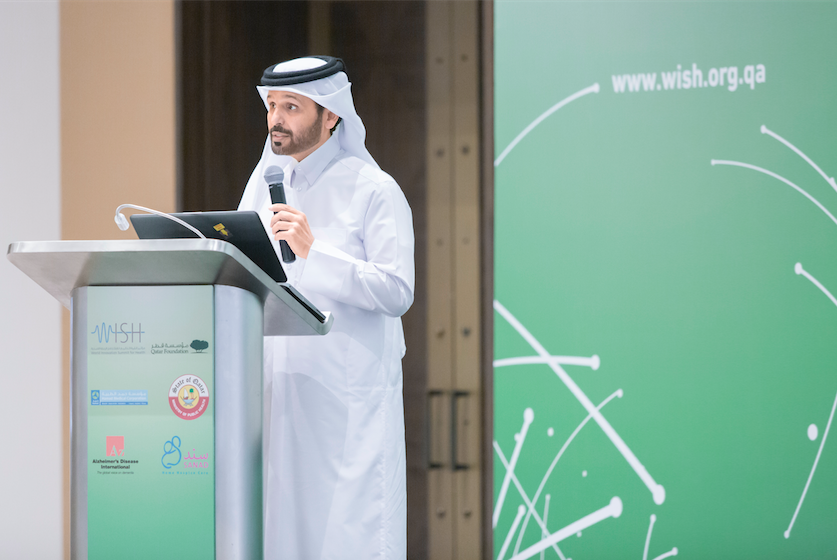Doha Declaration on Development of Palliative Care in Qatar

Declaration signed at the “Doha Declaration on Development of Palliative Care in Qatar” on 28 November 2021 in Doha.
In the last decade, efforts have been underway to build palliative care (PC) into Qatar’s national health care systems. Palliative care is currently available for oncology patients but not for patients with other diagnoses. The Hamad Medical Corporation (HMC) with support from the World Innovation Summit for Health (WISH) and Alzheimer’s Disease International are undertaking a development project to expand palliative care to people with non-oncologic palliative care needs, particularly the elderly and those with dementia. As an initial step, SANAD, the home hospice organization of Lebanon, conducted an assessment of the palliative care services needs of older patients HMC. Based on the results of this assessment, we support the following findings and recommendations for action:
Participating Organizations Acknowledge that:
-Access to palliative care is a human right (the right of everyone to enjoy the highest attainable level of physical and mental health) and is recognised by the World Health Organization as an integral element of Universal Health Coverage. The provision of palliative care is one of the ethical responsibilities of all healthcare systems.
-A project addressing the palliative care needs of older people is consistent with the Qatar National Strategy for Older Patients which includes palliative care as a component of healthy ageing.
-Considering the ageing population and increasing prevalence of dementia, the need for palliative care is expected to continue to rise.
-There are concerns about the existing quality and organisation of palliative care for older people in Qatar.
-While there is a lack of understanding about palliative care, there is a groundswell of interest and commitment to increasing the choices available to older people about where they die and the support they need to meet their own unique needs. This is often referred to as “dying with dignity.”
-There are huge strengths to build on in Qatar:
• The presence of high-quality, well-funded geriatric services.
• Existing home care services
• Well-regarded oncology palliative care services
-The model of care in Rumailah has a lot of common aspects with palliative care: being multi-disciplinary and patient- and family-centred.
-HMC is well positioned to provide the leadership necessary to implement palliative care for older people and those with dementia.
-Palliative care is essential to improve the quality of life of older patients with serious illnesses, their families, and caregivers.
-Excessive regulatory restrictions and lack of education about the use of essential controlled medicines deprive patients of access to effective pain relief and palliative care.
-Effective integration of palliative care into the Qatari healthcare system, and training for all primary health care workers in generalist palliative care will benefit the health care system through improved quality of care.
-Robust counselling services which incorporate religious guidelines are essential to ensure that patients, caregivers, and families have the information they need to make palliative care decisions.
-In the longer term, there is a need to ensure access to palliative care services for people of all ages, and there is a requirement to develop a National Qatari Palliative services plan to address these needs.
-Such a plan should be based on cost-effective and efficient models of palliative care, and include input from the government, medical organisations, social services, professional and charitable organizations as well as volunteer and religious communities. The involvement of each party is important to ensure the best interests of patients and their families.
In summary, we believe that the needs assessment process was a rich and a positive one, which has set the foundation for the following recommendations for action.
Call for Action:
1. To Implement a project to expand palliative care to older people with non-oncologic palliative care needs, particularly those with dementia, under the auspices of the Hamad Medical Corporation
– and in partnership with medical and patient communities – based on specialist services, home-based palliative care services, and hospital care.
To make this project a reality will require a significant commitment, including:
a) Technical training (specialist and generalist) to raise caregiver awareness of palliative care and structured educational support which follows best practices and adapts to cultural/religious needs.
b) The development of measures to improve the accessibility and quality of palliative care in Qatar.
c) Implementation of robust palliative care counselling services which incorporate religious guidelines.
d) Improving accessibility to different forms of opioid pain medications in outpatient and home care settings.
2. To develop a funded national strategy and action plan for the implementation of expanded palliative care in Qatar for people of all ages. This plan should include the completion of a needs assessment with the aim of recognising palliative care as an integral part of the health system in Qatar and integrating these services into future health development strategies.
Approved 28 November in Doha, Qatar
By the Following Organizations
Qatar Ministry of Public Health
Hamad Medical Corporation
World Innovation Summit for Health
Alzheimer’s Disease International
Worldwide Hospice Palliative Care Alliance
Download the guide from here




